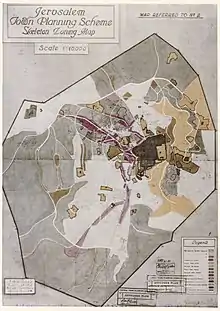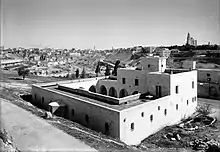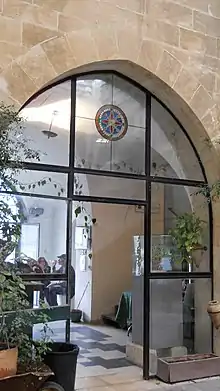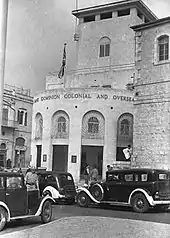Clifford Holliday
Albert Clifford Holliday (1897–1960) M. Arch, Dip. C.D., F.R.I.B.A., M.T.P.,[1] was a British architect and town planner who worked in several places across the British Empire, including Mandatory Palestine, Ceylon and Gibraltar, as well as in the UK.
Albert Clifford Holliday | |
|---|---|
| Born | 21 December 1897 Gildersome, England |
| Died | 26 September 1960 (aged 62) Manchester, England |
| Nationality | British |
| Alma mater | University of Liverpool |
| Occupation | Architect |
| Design | Master plan of Jerusalem |

Studies
Holliday gained his qualifications at the University of Liverpool where he studied under Sir Charles Reilly and Patrick Abercrombie.[2] He later designed the University of Ceylon with Abercrombie.[3]
Career
Mandate Palestine
Holliday was commissioned as civic adviser to the city of Jerusalem between 1922 and 1926[3] and town planning advisor to the mandatory government of Palestine between 1928 and 1934.[2] He drew up a master plan for Jerusalem and the restoration of its Old City walls.[4]
United Kingdom
In 1938, Holliday's design for a satellite town near Kincorth, outside Aberdeen, won an international prize.[3]
In 1947, he was appointed Chief Architect for the first postwar British new town, Stevenage.[2] He revised the plan for Stevenage, from the Ministry of Town and Country Planning's original plan, in 1949.[5]
In 1952 Holliday became Professor of Town and Country Planning at the University of Manchester.[3]
He was also involved in preparing the designs for Haslingden and Stoke-on-Trent.[3]
Private life
Holliday had four sons.
Selected work
Jerusalem
- St John Ophthalmic Hospital's new wing, opened in 1930. Since the 1960s an arts and crafts center, the Jerusalem House of Quality.[6]
- St Andrew's Church, aka the Scots Memorial Church (1930)
- Old Town Hall (1930)
- British and Foreign Bible Society Building (1926-28), 7 Yohanan MeGush Halav Street, now 8 Safra Square, currently housing municipality offices.[7][8]
Elsewhere
- University of Ceylon, together with Patrick Abercrombie.[3]
Gallery
 Ophthalmic Hospital Jerusalem, new wing seen from St Andrew's Church (1934-39)
Ophthalmic Hospital Jerusalem, new wing seen from St Andrew's Church (1934-39) Ophthalmic Hospital, today's Jerusalem House of Quality
Ophthalmic Hospital, today's Jerusalem House of Quality Bible Society Building, design: A. Clifford Holliday's firm, Jerusalem, 1926-28
Bible Society Building, design: A. Clifford Holliday's firm, Jerusalem, 1926-28 Barclay's building, design: A. Clifford Holliday's firm, Jerusalem, 1939
Barclay's building, design: A. Clifford Holliday's firm, Jerusalem, 1939 St. Andrew's Church, design: A. Clifford Holliday's firm, Jerusalem, opened 1930
St. Andrew's Church, design: A. Clifford Holliday's firm, Jerusalem, opened 1930
See also
- Charles Robert Ashbee, first British-appointed town planner of Jerusalem (1919-1922)
- Patrick Geddes, designed the master plan for Tel Aviv in 1927
- Zoltan Harmat, Jewish architect who worked both for Holliday's Jerusalem office and privately
- Austin Harrison, British town planner and architect active in Mandatory Palestine
- Richard Kauffmann, Jewish-German town planner and architect active in Mandatory Palestine
- Ernest Tatham Richmond, British architect, Consulting Architect to the Haram ash-Sharif (1918–20)
References
- 'University of Manchester' (advertisement) Manchester Guardian, 18 January 1957 p. 12
- 'Stevenage Architect', Manchester Guardian, 16 October 1947, p. 6
- 'Prof. C. Holliday' London Guardian, 30 September 1960 p. 15
- Herbert, Gilbert (2003). "Holliday, A(lbert) Clifford". Oxford Art Online. doi:10.1093/gao/9781884446054.article.t038658. ISBN 978-1-884446-05-4.(subscription required)
- Frank Schaffer, The New Town Story, Macgibbon and See, London 1970 p. 261
- "Jerusalem House of Quality". Retrieved 2 January 2017.
- "A Tantalizing Tour of Jerusalem's Magical Armenian Tiles". Moshe Gilad for Haaretz. 11 December 2019. Retrieved 2 June 2022.
- "8 Safra Square". emporis.com. Retrieved 2 June 2022.
- Yacobi, Haim (2010). "The language of modernity : urban design in mandatory Lydda". Jerusalem Quarterly. Institute of Jerusalem Studies (42): 80-93 []. Retrieved 29 November 2021.